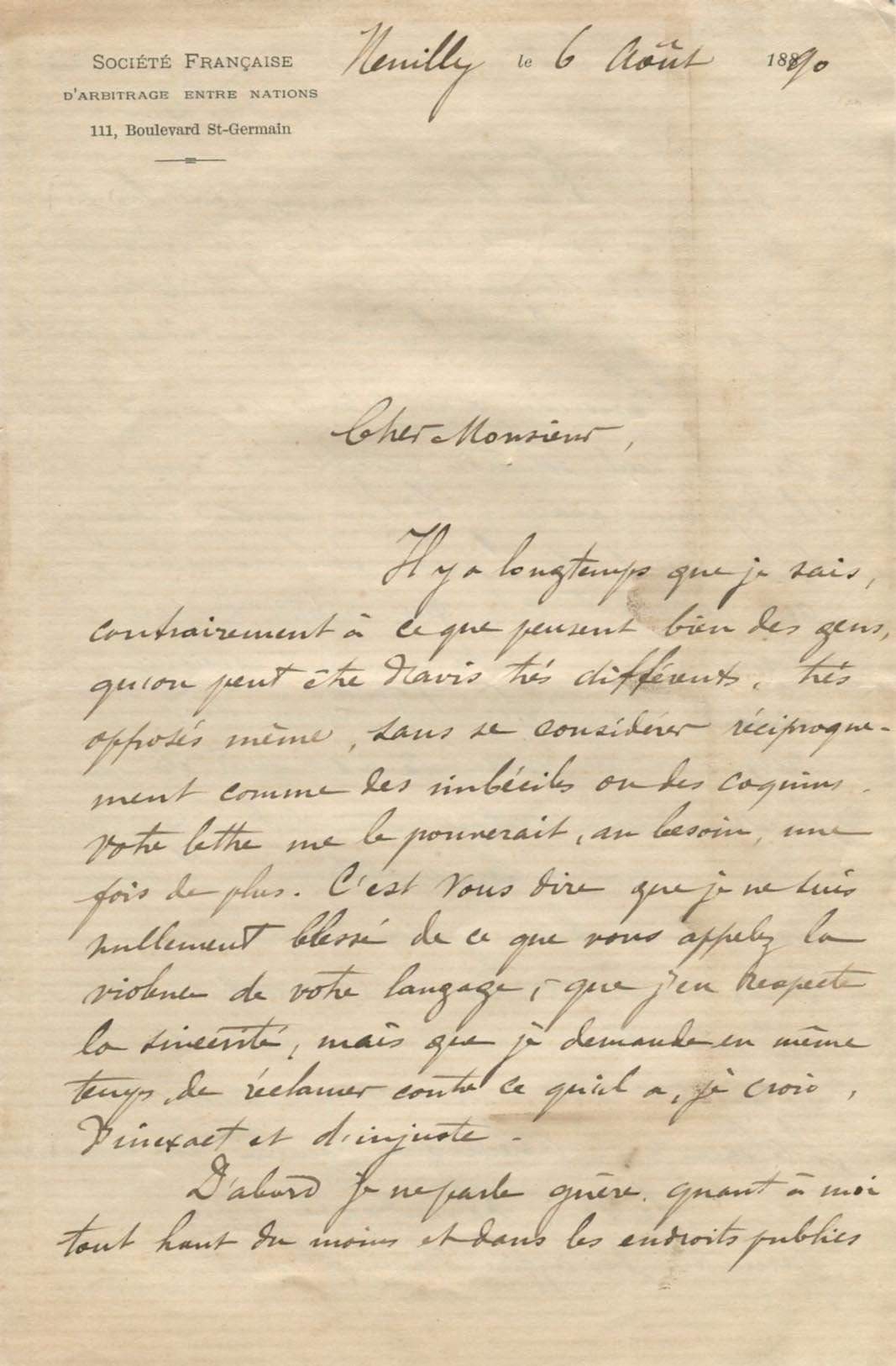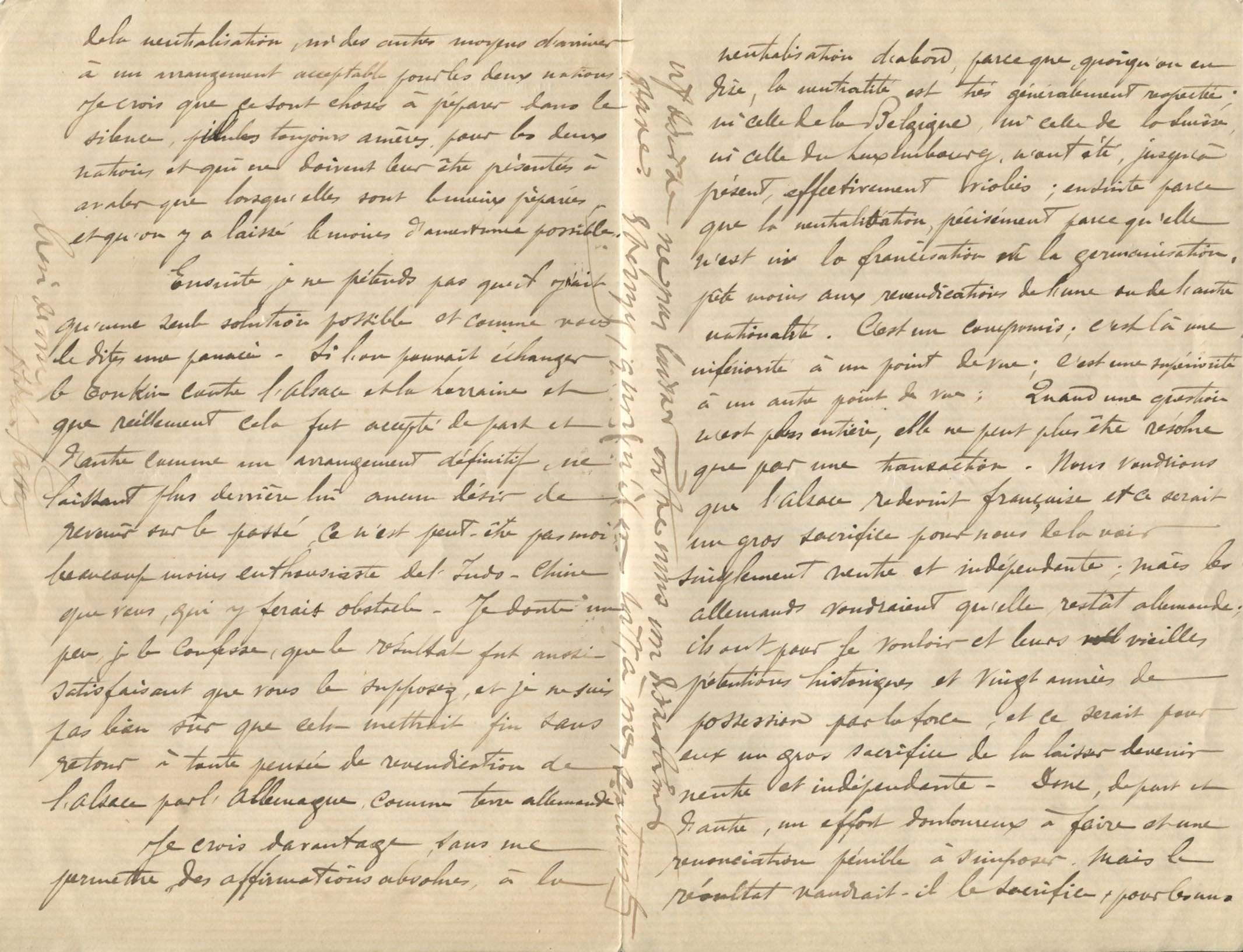Description
"Cher Monsieur,
... c'est un compromis; c'est là une infériorité à un point de vue; c'est une supériorité à un autre point de vue ... nous voudrions que l'alsace redevient française et ce serait un gros sacrifier pour nous de la voir simplement neutre et indépendante; mais les allemands voudrais qu'elle restait allemande; ils ont pour le vouloir et leurs vieilles prétentions historiques et vingt années de possession par la force, et ce serait pour eux un gros sacrifice de la laisser devenir neutre et indépendante. Donc, de part et d'autre, un effort douloureux à faire et une pensuciation pénible à s'imposer, mais le résultat voudrait il le sacrifier pour les unes et pour les autres ? Ne serait-ce rien que d'avoir obtenu du vainqueur la réputation du droit de conquete, d'avoir fait reconnaitre quels peuples s'appartiennent, d'avoir entre du centre du l'Europe, une cause perpetuelle d'inquiétudes et de dangers ... je suis convaincu, pour une part, que la chose est tres difficulte à faire, tres difficile à faire accepter, mais je ne suis pas moins convaincu que si une fais elle l'était, ce serait dans un tres court délai l'ouverture d'une éra d'apaisement général et l'imposibilité pour les gouvernements d'entrainer les peuples dans les nouvelles guerres.
je comprend admirablement le sentiment généreux (...) qui vous révolte, mais n'y a t-il pas aussi quelque chose degenereux et de grand dans la resignation d'un Jean Dollfus, d'un Lichtenberger, ces hommes si patriotes et si courageux, déclarant qu'ils ne veulent pas ennuier (?) le monde à de nouveaux massacres et comme je l'ai dit dans ma notice sur Dollfus que je vous renvais; ne serait ce pas un grand honneur pour l'alsace si longtemps foulie aux pieds par les armées des deux nations, de devenir enfin le gage pacifique de la réconciliation et la terre d'avoir s'etendrait au loin la pacification ?...
Frederic Passy"
Translated:
"Dear Sir,
...it's a compromise; it is is an inferiority to a point of view; it's a superiority to another point of view ... we would like Alsace to become French again and it would be a big sacrifice for us to see it simply neutral and independent; but the Germans would like it to remain German; they have the will and their old historical claims and twenty years of possession by force, and it would be a great sacrifice for them to let it become neutral and independent. So, on both sides, a painful effort to make and a painful thought to impose, but would the result sacrifice it for both? Is it nothing but having obtained from the victor the reputation of the right of conquest, to have recognized which people belong to each other, to have a perpetual cause of anxiety and of dangers ... I am convinced, for a part, that the thing is very difficult to do, very difficult to accept, but I am no less convinced that if one were to do so, it would be in a very short time the opening of a period of general appeasement and the impossibility for governments to drag the peoples into new wars.
I admirably understand the generous feeling (...) that revolts you, but is there not also something degenerate and great in the resignation of a Jean Dollfus, a Lichtenberger, these men so patriotic and so courageous, declaring that they do not want to annoy the world with new massacres and as I said in my note on Dollfus that I sent you back; Would it not be a great honor for Alsace, so long trampled on by the armies of the two nations, to finally become the peaceful pledge of reconciliation and the land of having spread pacification far and wide?...
Frédéric Passy"
* In 1870 the Franco-Prussian War could not be prevented so the league dissolved and refounded as the 'Société française pour l'arbitrage entre nations' (League of arbitration between the Nations) in the same year. The Société française pour l'arbitrage entre nations can be seen as a precursor of the Permanent Court of Arbitration, founded with the first Hague Peace Conference in 1899, and a precursor of the League of Nations, founded with the Treaty of Versailles in 1919 and followed by the United Nations.
**The Imperial Territory of Alsace-Lorraine (German: Reichsland Elsaß-Lothringen or Elsass-Lothringen) was a territory created by the German Empire in 1871, after it annexed most of Alsace and the Moselle department of Lorraine following its victory in the Franco-Prussian War.
Further Information on the person
Profession:
(1822 - 1912) French economist and a joint winner (together with Henry Dunant) of the first Nobel Peace Prize awarded in 1901
Year of Birth: 1822
Certificate of authenticity
All of our pieces are sold with a Certificate of Authenticity. If a piece turns out to be wrong or if you do not like an autograph, you will get your money back for a lifetime.
Payment & Security
Your payment information is processed securely. We do not store credit card details nor have access to your credit card information.




